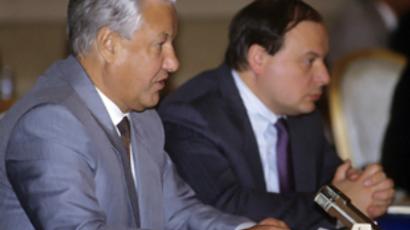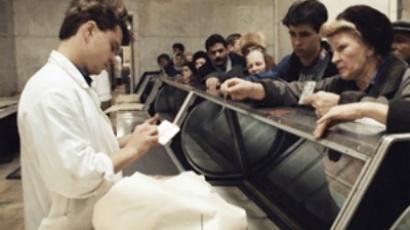Famous Russian politician Yegor Gaidar dies
One of the architect's of Yeltsin's economic reforms and prominent Russian politician, Yegor Gaidar, has died on Wednesday aged 53.
“Gaidar died suddenly on December 16, at 4am. He was at home, working on his scientific research. He died because of the clot that broke away,” Valery Natarov, press secretary for The Institute for the Economy in Transition, told RT.
For comments on Gaidar's legacy RT tried to get in contact with Anatoly Chubais, Gaidar's close associate in the reforms, former deputy prime minister and one of his closest friends. His press-service however said, "Chubais is in deep grief, he has cancelled all meetings and won't talk to the press today". However, here's what Chubais himself wrote in his blog:"Last night, my friend Yegor Gaidar died.
He was a great person. A great academic and a great statesman.
Few people in the history of Russia or world history can come close to him in terms of intellect, clarity of understanding of the past, present and future as well as his willingness to make the toughest but most necessary decisions.
Russia was incredibly lucky to have had Yegor Gaidar during one of the most difficult periods in its history. At the beginning of the ’90s he saved the country from hunger, civil war and collapse. Over the years to follow, he had become an intellectual and moral leader for all of us. For me, he was, and will always remain, the highest possible standard of honesty, courage and security.
I will carry this loss for the rest of my life."
Gaidar was a key member of the Boris Yeltsin administration in the early ’90s and is considered one of the main masterminds of the Russian economic changes that followed the August Coup of 1991.
He became the public face of the “shock therapy”, which was meant to help the state overcome the economic crisis and, in a short period, move from the Soviet-style command economy to a market economy. The program of radical reforms was launched in autumn 1992, and began with price liberalization: free market prices for most goods were introduced and the government could no longer control them.
However, the situation slipped completely out of control. Initially, the government predicted a threefold rise in prices and, based on that forecast, planned increases in pensions and salaries for public servants. In fact, prices rocketed ten to twelve times higher than they were prior to the reform.
As a result of the hyper-inflation, millions of Russians lost their life-long savings and found themselves below the poverty line. The state economy suffered the consequences of “shock therapy” as well. No wonder, then, the majority of Russian citizens were angered and criticized harshly the team of young reformers.
Gaidar was also considered to be one of the innovators behind the controversial privatization and the break-up of state assets under Boris Yeltsin – leading to some people making vast fortunes.
Gaidar biography
Grandson to a famous writer, Arkady Gaidar, Yegor Gaidar was born on 19 March, 1956. He graduated from the Department of Economics at Moscow State University in 1978 and received his PhD in economics in 1980.On the threshold of Russian reforms in 1990, he became a director of the newly-established Institute for Economic Policy, now known as the Institute for the Economy in Transition.
Gaidar began his stellar political career in 1991, taking the post of Deputy Chairman of the Government of Russia, in charge of matters of economic policy.
He was appointed Acting Chairman of the Government of Russia in 1992 and, after a short period of resignation, he returned the government in 1993 as First Deputy Chairman and Acting Minister of Economy.
Between 1992 and 1994 he was a counselor on economic policy to the first Russian President, Boris Yeltsin, but resigned in protest over the war in Chechnya.
During his life, Yegor Gaidar published over 100 articles on economics. Until his death he worked as a director of Institute for the Economy in Transition.














